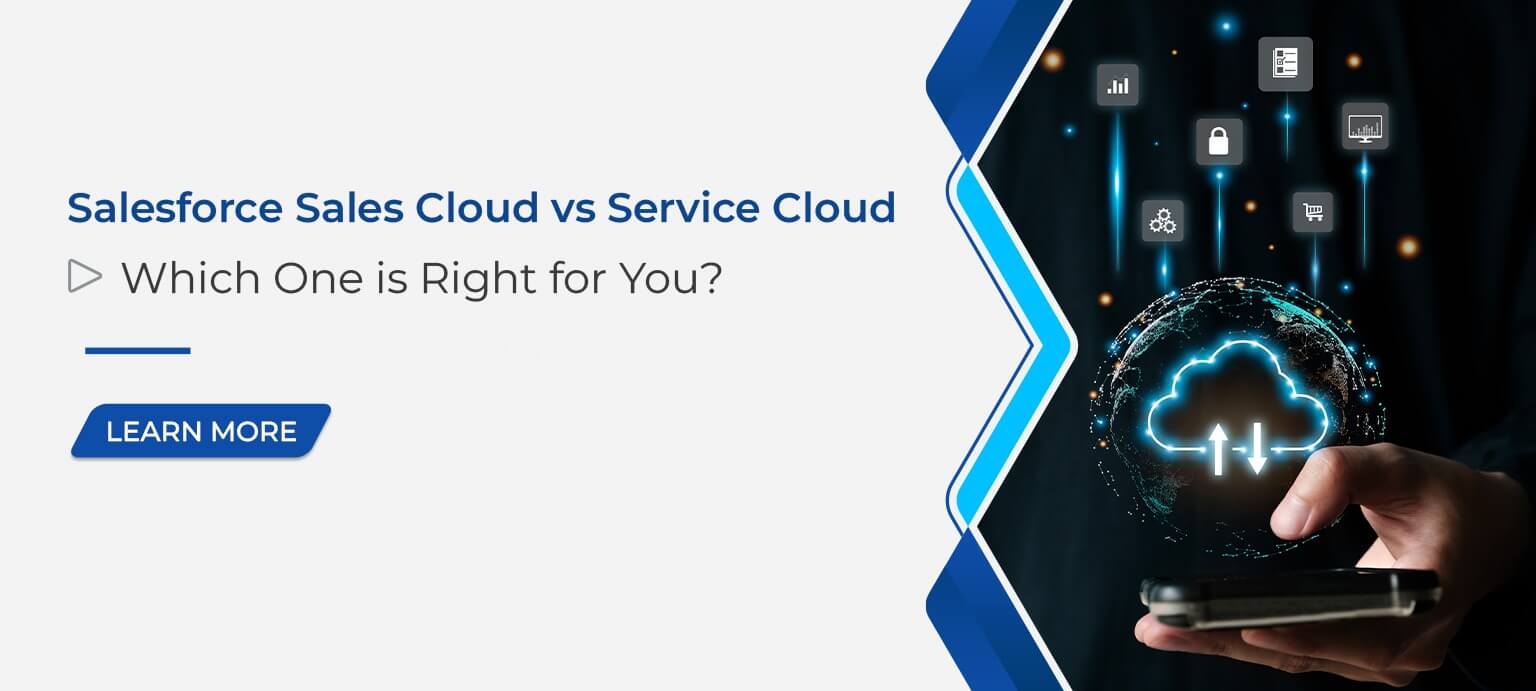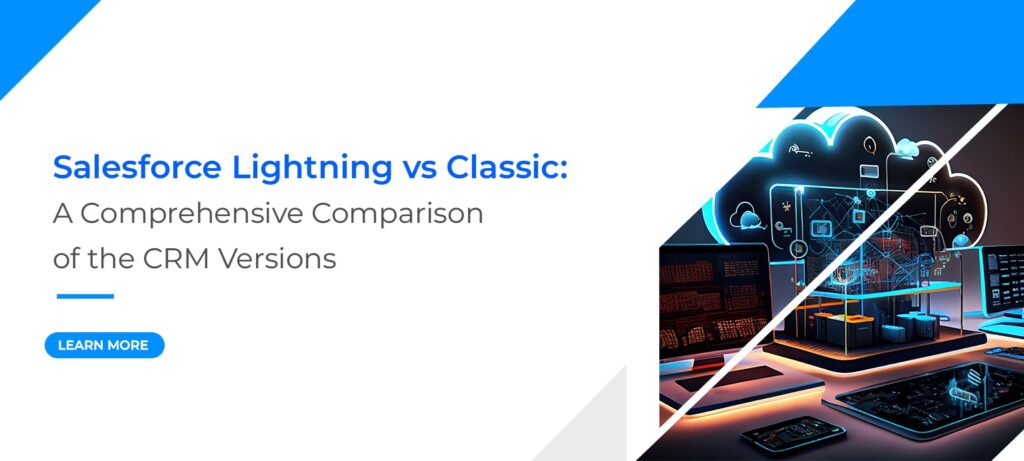In today’s highly competitive business landscape, organizations are constantly striving to deliver exceptional customer experiences. To achieve this, they need robust customer relationship management (CRM) solutions that empower their sales and service teams to drive revenue growth and provide top-notch customer support. Two popular options in the CRM space are Salesforce Sales Cloud and Service Cloud. While both platforms are part of the Salesforce ecosystem, they cater to different aspects of the customer journey. In this blog post, we’ll explore the key differences between Salesforce Sales Cloud and Service Cloud to help you determine which one is the right fit for your business.
Salesforce Sales Cloud: Empowering Your Sales Team
Sales Cloud is Salesforce’s flagship CRM application designed to streamline and optimize sales processes. It provides a comprehensive set of tools and features that enable sales teams to effectively manage leads, opportunities, and customer relationships. Here are some key features of Salesforce Sales Cloud:
• Opportunity Management: Sales Cloud allows you to track and manage sales opportunities from initial contact to closing the deal. It provides a centralized view of all customer interactions, allowing your sales team to prioritize leads and focus on high-value opportunities.
• Lead Management: With Sales Cloud, you can capture and track leads from various sources, such as web forms, marketing campaigns, and trade shows. It enables lead assignment, lead scoring, and automated lead nurturing, ensuring your sales team never misses a potential opportunity.
• Sales Forecasting: Sales Cloud provides powerful forecasting capabilities that help you predict sales revenue and track sales performance. It allows you to analyze historical data, identify trends, and make informed decisions to drive revenue growth.
• Sales Analytics: The platform offers robust reporting and analytics features, enabling you to gain insights into your sales pipeline, team performance, and revenue projections. Customizable dashboards and real-time reports empower your sales managers to make data-driven decisions and optimize sales strategies.
Service Cloud: Transforming Customer Support
Service Cloud is Salesforce’s CRM solution tailored specifically for customer service and support teams. It enables organizations to deliver exceptional customer experiences by providing a unified platform for case management, knowledge base, and omni-channel support. Here are some key features of Salesforce Service Cloud:
• Case Management: Service Cloud allows you to efficiently manage customer cases, ensuring timely resolution and customer satisfaction. It provides a centralized view of customer interactions, enabling your support agents to track case history, escalate issues, and collaborate with other teams to resolve complex problems.
• Knowledge Base: Service Cloud offers a robust knowledge base that empowers both your support agents and customers to find answers to common questions. It enables you to create and manage a repository of articles, FAQs, and documentation, reducing support ticket volumes and enabling self-service support.
• Omni-Channel Support: Service Cloud enables seamless customer support across multiple channels, including phone, email, chat, social media, and self-service portals. It provides a unified view of customer interactions across all channels, allowing your support agents to deliver consistent and personalized support experiences.
• Service Analytics: The platform offers comprehensive reporting and analytics capabilities for your customer service operations. You can track key performance metrics, measure customer satisfaction, and identify areas for improvement. Real-time insights enable you to optimize your support processes and enhance customer loyalty.
Choosing the Right Solution for Your Business
Now that we’ve explored the key features of Salesforce Sales Cloud and Service Cloud, let’s discuss how to determine which one is right for your business. Consider the following factors:
1) Business Focus: If your primary focus is on driving sales and managing the sales pipeline, Sales Cloud is the ideal choice. It provides robust features for lead management, opportunity tracking, and sales analytics, empowering your sales team to close deals more effectively.
2) Customer Support Needs: If customer support and service excellence are your top priorities, Service Cloud is the way to go. It offers advanced case management, knowledge base, and omni-channel support capabilities that enable you to deliver exceptional support experiences across multiple channels.
3) Integration Requirements: Evaluate your existing technology stack and integration needs. Both Sales Cloud and Service Cloud seamlessly integrate with other Salesforce products and a wide range of third-party applications. Consider your integration requirements to ensure a smooth workflow across your sales and service operations.
4) Scalability and Customization: Assess the scalability and customization options offered by each platform. Salesforce provides extensive customization capabilities, allowing you to tailor the CRM solution to your specific business needs. Consider your long-term growth plans and customization requirements when making a decision.
5) Budget Considerations: Finally, consider the cost implications of each solution. Salesforce Sales Cloud and Service Cloud pricing varies based on the edition and number of users. Evaluate your budget and choose a solution that aligns with your financial resources and expected return on investment.
The Bottom Line
Salesforce Sales Cloud and Service Cloud are powerful CRM solutions that address different aspects of the customer journey. Sales Cloud focuses on empowering sales teams to drive revenue growth, while Service Cloud enables organizations to deliver exceptional customer support experiences. By considering your business focus, customer support needs, integration requirements, scalability, customization options, and budget considerations, you can make an informed decision on whether Salesforce Sales Cloud or Service Cloud is the right fit for your business.
Remember, Salesforce offers a range of other cloud solutions that can complement Sales Cloud or Service Cloud, such as Marketing Cloud for marketing automation, Commerce Cloud for e-commerce, and Community Cloud for building customer and partner communities. It’s worth exploring these options to create a comprehensive Salesforce ecosystem that caters to all aspects of your business.
Ultimately, the right choice depends on your unique business requirements and goals. If you need assistance in making a decision or require further information about Salesforce Sales Cloud or Service Cloud, don’t hesitate to reach out to consult with a Salesforce implementation partner who can provide guidance tailored to your specific needs.
Whichever option you choose, implementing a Salesforce CRM solution will undoubtedly empower your organization to enhance customer relationships, boost sales, and deliver exceptional customer experiences in today’s competitive marketplace.
If you are in search of a reliable and experienced partner to implement Salesforce solutions in your business, CSA Consultants should be your go-to choice. With our proven expertise in Salesforce implementation, coupled with a strong commitment to facilitating business success, we are well-positioned to provide you with the comprehensive guidance and robust support you need. Our aim is to help you leverage Salesforce to its full potential, thereby maximizing your return on investment. We believe in creating value for our clients by ensuring that their Salesforce implementation is tailored to their unique business needs and objectives. So, if you’re ready to take your business to the next level with Salesforce, consider partnering with CSA Consultants.


























